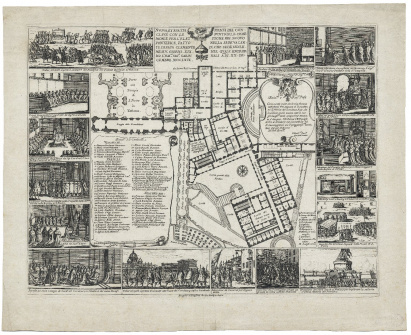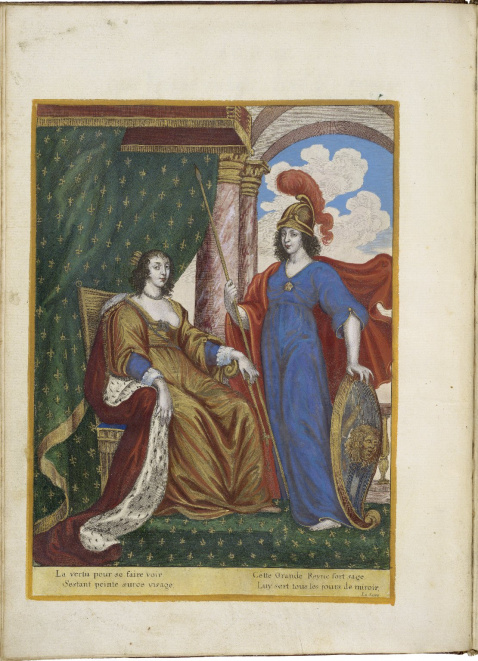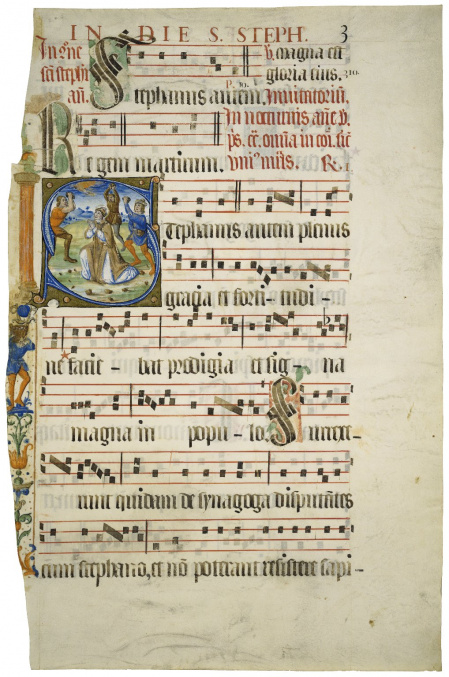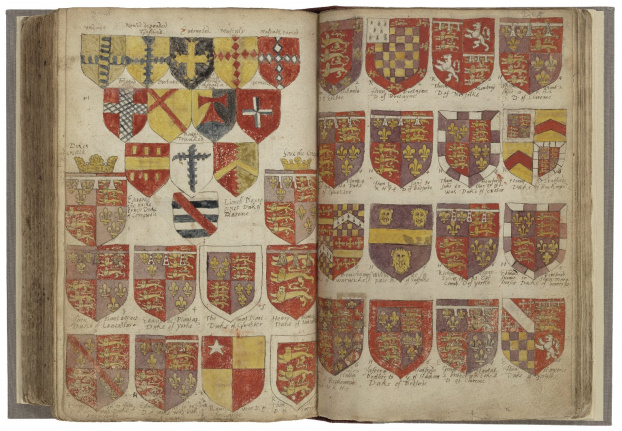Redefining the Sacred in Early Modern England: Difference between revisions
No edit summary |
No edit summary |
||
| Line 1: | Line 1: | ||
Directed by '''[[Claire Sponsler]]''', Professor of English at the University of Iowa | |||
June 21 through July 23, 2010 | |||
This [[NEH_Summer_Institute_for_college_and_university_faculty|NEH Summer Institute for College and University Faculty]] offered a comparative study of ritual and ceremony across related European cultures from 1300 to 1700. It built on anthropological theories of the ubiquitous role of ritual and ceremony and the impact of that work in performance studies. Testing assumptions about influence and exchange among national traditions and local contexts, it sought a new understanding of the processes and effects of cultural hybridity and assimilation. | |||
[[File:ART Box R763 no.23.jpg|thumb|411x411px|right|[http://luna.folger.edu/luna/servlet/s/i7cx0w Source Call Number: ART Box R763 no.23]: Nuoua et essatta pianta del conclaue con le funtioni e ceremonie per l'elettione del nuouo pontefice fatto nella sede vacante…]] | |||
Beginning with an exploration of the theories and definitions of “ritual,” each subsequent session advanced topically, chronologically, and geographically while touching on the implications of ceremony and ritual in religious, domestic, and secular contexts. Throughout the institute, participants used the Folger’s collections. They first read about ceremonies and liturgical performance through medieval authors including Hildegard of Bingen and Chaucer. Rituals surrounding motherhood and birthing practices, specifically the childbed, were also examined as sites of domestic ritualistic performance. Moving into the civic sphere, the session topics included records of Lord Mayor shows, pageant plays, royal entries, and other public ceremonies. The institute concluded with representations of ceremony on the early modern stage through histories and tragedies, discussions of the materials of ritual, and sites of pilgrimage. | |||
<u><br>'''Materials and Products'''</u> | |||
The syllabus is available [[Media:Ritual and Ceremony syllabus.pdf|here]]. | |||
While the website is no longer supported, it has been archived: | |||
[http://wayback.archive-it.org/2873/20140918232027/http://www.folger.edu/folger_institute/ritual_ceremony/ Institute Website: Ritual and Ceremony] | |||
A PDF of the[[Media:Ceremony.pdf| website's pages]] with the participants' interpretive essays. | |||
A PDF of the original [[Media:NEHRitual&Ceremony.pdf|promotional flyer]]. | |||
[[File:STC_20488.jpg|thumb|661x661px|left|[http://luna.folger.edu/luna/servlet/s/525anq Source Call Number STC 20488]: Histoire de l'entree de la reyne mere du roy tres-Chrestien, dans la Grande-Bretaigne. Enrichie de planches. Par le Sr. de la Serre, Historigraphe de France.]] | |||
'''<u>Participants</u>''' | |||
(All affiliations are as of the program's date) | |||
<strong>Bernadette Andrea</strong>, Professor of English, University of Texas, San Antonio | |||
<strong>Christopher J. Bilodeau</strong>, Assistant Professor of History, Dickinson College | |||
<strong>Rachel L. Burk</strong>, Visiting Assistant Professor of Spanish and Portuguese, Tulane University | |||
<strong>Peter Craft</strong>, PhD Candidate in English, University of Illinois,Urbana-Champaign | |||
<strong>J. Caitlin Finlayson</strong>, Assistant Professor of English, University of Michigan, Dearborn | |||
<strong>Elina Gertsman</strong>, Assistant Professor of Medieval Art, Case Western Reserve University | |||
<strong>Marcia B. Hall</strong>, Professor of Art History, Temple University | |||
<strong>Matthew C. Hansen</strong>, Assistant Professor of English, Boise State University | |||
<strong>Kenneth L. Hodges</strong>, Associate Professor of English, University of Oklahoma | |||
<strong>John M. Hunt</strong>, Term Assistant Professor of History, University of Louisville | |||
<strong>Matthew W. Irvin</strong>, Assistant Professor of English, Sewanee The University of the South | |||
<strong>Nancy J. Kay</strong>, Adjunct Assistant Professor of Art History, Merrimack College | |||
<strong>Andrew D. McCarthy</strong>, Assistant Professor of English, University of Tennessee, Chattanooga | |||
<strong>Cynthia Nazarian</strong>, Assistant Professor of French and Italian, Northwestern University | |||
<strong>Patrick O’Banion</strong>, Assistant Professor of History, Lindenwood University | |||
<strong>Stephanie M. Seery-Murphy</strong>, Lecturer in History, California State University, Sacramento | |||
<strong>Christopher Swift</strong>, PhD Candidate in Theatre Studies, City University of New York, Graduate Center | |||
<strong>Lisa Voigt</strong>, Associate Professor of Spanish and Portuguese, The Ohio State University | |||
<strong>Anne E. Wohlcke</strong>, Assistant Professor of History, California State Polytechnic University, Pomona | |||
<strong>Suzanne M. Yeager</strong>, Assistant Professor of English and Medieval Studies, Fordham University | |||
'''<u>Faculty</u>''' | |||
[[File:Z.e.4_Map_case.jpg|thumb|677x677px|right|[http://luna.folger.edu/luna/servlet/s/9sx4a6 Source Call Number Z.e.4 Map case]: St. Stephen's day hymn ]] | |||
(All affiliations are as of the program's date) | |||
<strong>Ian Archer</strong>, Keble College, Oxford | |||
<strong>Lawrence M. Bryant</strong>, California State University, Chico | |||
<strong>Barbara Fuchs</strong>, UCLA | |||
<strong>Gail McMurray Gibson, </strong>Davidson College | |||
<strong>Bruce Holsinger</strong>, University of Virginia | |||
<strong>Roslyn L. Knutson</strong>, University of Arkansas, Little Rock | |||
<strong>Joseph Roach</strong>, Yale University | |||
<strong>Helen Watanabe-O'Kelly</strong>, Exeter College, Oxford | |||
<strong>Michael Wintroub</strong>, University of California Berkeley | |||
<strong>Barbara Wisch</strong>, SUNY Cortland | |||
'''<u>Website Production</u>''' | |||
<strong>Claire Sponsler</strong>, Advisory Editor | |||
<strong>Kathleen Lynch</strong>, Editor | |||
<strong>Owen Williams</strong>, Associate Editor | |||
<strong>Adrienne Shevchuk</strong>, Production and Managing Editor | |||
<strong>Allison Isberg</strong>, Editorial Assistant | |||
<strong>Swim Design</strong>, Design and Development | |||
<strong>Julie Ainsworth</strong>, Folger Shakespeare Library Photographer | |||
<u><br></u> | |||
[[File:V.b.74.jpg|thumb|622x622px|left|[http://luna.folger.edu/luna/servlet/s/2e25o0 Source Call Number V.b.74]: Armorial of English families]] | |||
'''<u>Folger Institute Staff</u>''' | |||
<strong>David Schalkwyk</strong>, Chair | |||
<strong>Kathleen Lynch</strong>, Executive Director | |||
<strong>Owen Williams</strong>, Assistant Director | |||
<strong>Adrienne Shevchuk</strong>, Program Assistant | |||
<strong>Matthew Carr</strong>, Intern | |||
For more past programming from the [[Folger Institute]], please see the article [[Folger Institute scholarly programs archive]]. | |||
Hosted by the Folger Shakespeare Library. For more information about current summer seminars, please visit the National Endowment for the Humanities [http://www.neh.gov/divisions/education/summer-programs/ website]. | |||
[[Category: Folger Institute]] | |||
[[Category: Scholarly programs]] | |||
[[Category:National Endowment for the Humanities]] | |||
[[Category: Program archive]] | |||
[[Category: Seminar]] | |||
[[Category: 15th century]] | |||
[[Category: 16th century]] | |||
[[Category: 17th century]] | |||
[[Category:2010-Summer]] | |||
[[NEH Summer Institute for college and university faculty|NEH Summer Institute]] | [[NEH Summer Institute for college and university faculty|NEH Summer Institute]] | ||
Revision as of 09:38, 4 August 2017
Directed by Claire Sponsler, Professor of English at the University of Iowa
June 21 through July 23, 2010
This NEH Summer Institute for College and University Faculty offered a comparative study of ritual and ceremony across related European cultures from 1300 to 1700. It built on anthropological theories of the ubiquitous role of ritual and ceremony and the impact of that work in performance studies. Testing assumptions about influence and exchange among national traditions and local contexts, it sought a new understanding of the processes and effects of cultural hybridity and assimilation.

Beginning with an exploration of the theories and definitions of “ritual,” each subsequent session advanced topically, chronologically, and geographically while touching on the implications of ceremony and ritual in religious, domestic, and secular contexts. Throughout the institute, participants used the Folger’s collections. They first read about ceremonies and liturgical performance through medieval authors including Hildegard of Bingen and Chaucer. Rituals surrounding motherhood and birthing practices, specifically the childbed, were also examined as sites of domestic ritualistic performance. Moving into the civic sphere, the session topics included records of Lord Mayor shows, pageant plays, royal entries, and other public ceremonies. The institute concluded with representations of ceremony on the early modern stage through histories and tragedies, discussions of the materials of ritual, and sites of pilgrimage.
Materials and Products
The syllabus is available here.
While the website is no longer supported, it has been archived: Institute Website: Ritual and Ceremony
A PDF of the website's pages with the participants' interpretive essays.
A PDF of the original promotional flyer.

Participants
(All affiliations are as of the program's date)
Bernadette Andrea, Professor of English, University of Texas, San Antonio
Christopher J. Bilodeau, Assistant Professor of History, Dickinson College
Rachel L. Burk, Visiting Assistant Professor of Spanish and Portuguese, Tulane University
Peter Craft, PhD Candidate in English, University of Illinois,Urbana-Champaign
J. Caitlin Finlayson, Assistant Professor of English, University of Michigan, Dearborn
Elina Gertsman, Assistant Professor of Medieval Art, Case Western Reserve University
Marcia B. Hall, Professor of Art History, Temple University
Matthew C. Hansen, Assistant Professor of English, Boise State University
Kenneth L. Hodges, Associate Professor of English, University of Oklahoma
John M. Hunt, Term Assistant Professor of History, University of Louisville
Matthew W. Irvin, Assistant Professor of English, Sewanee The University of the South
Nancy J. Kay, Adjunct Assistant Professor of Art History, Merrimack College
Andrew D. McCarthy, Assistant Professor of English, University of Tennessee, Chattanooga
Cynthia Nazarian, Assistant Professor of French and Italian, Northwestern University
Patrick O’Banion, Assistant Professor of History, Lindenwood University
Stephanie M. Seery-Murphy, Lecturer in History, California State University, Sacramento
Christopher Swift, PhD Candidate in Theatre Studies, City University of New York, Graduate Center
Lisa Voigt, Associate Professor of Spanish and Portuguese, The Ohio State University
Anne E. Wohlcke, Assistant Professor of History, California State Polytechnic University, Pomona
Suzanne M. Yeager, Assistant Professor of English and Medieval Studies, Fordham University
Faculty

(All affiliations are as of the program's date)
Ian Archer, Keble College, Oxford
Lawrence M. Bryant, California State University, Chico
Barbara Fuchs, UCLA
Gail McMurray Gibson, Davidson College
Bruce Holsinger, University of Virginia
Roslyn L. Knutson, University of Arkansas, Little Rock
Joseph Roach, Yale University
Helen Watanabe-O'Kelly, Exeter College, Oxford
Michael Wintroub, University of California Berkeley
Barbara Wisch, SUNY Cortland
Website Production
Claire Sponsler, Advisory Editor
Kathleen Lynch, Editor
Owen Williams, Associate Editor
Adrienne Shevchuk, Production and Managing Editor
Allison Isberg, Editorial Assistant
Swim Design, Design and Development
Julie Ainsworth, Folger Shakespeare Library Photographer

Folger Institute Staff
David Schalkwyk, Chair
Kathleen Lynch, Executive Director
Owen Williams, Assistant Director
Adrienne Shevchuk, Program Assistant
Matthew Carr, Intern
For more past programming from the Folger Institute, please see the article Folger Institute scholarly programs archive.
Hosted by the Folger Shakespeare Library. For more information about current summer seminars, please visit the National Endowment for the Humanities website.
Center for Shakespeare Studies
June 22 through July 31, 1998
Institute Website (Archived): Institute Website Part I (PDF): Institute Website Part 2 (PDF)
Directed by Richard C. McCoy, Professor of English at Queens College and the Graduate School and University Center at the City University of New York
"Redefining the Sacred in Early Modern England" will explore the varieties of religious thought and experience in the English Reformation along with current scholarly approaches to the subject, giving special emphasis to the adaptation of primary materials for instructional purposes.
The institute will examine the persistent doctrinal ambiguities found in such sources as the plays of Shakespeare, the poetry of Donne and Milton, the polemics of the English Civil War, and published and unpublished works by women authors. It will also probe links between popular and high culture as they are forged between sectarian politics and theological dogma, polemical tracts and literary fictions, social history and the history of ideas, and great works of art and acts of iconoclasm.
Central to the work of the institute is the vigorous reexamination of the Reformation by a cadre of renowned scholars, many of whom have agreed to serve as visiting faculty. The institute will investigate new historical challenges to older, teleological conceptions of reform (often characterized as Whiggish) that saw the period as a slow and steady advance toward secularization. It will examine the contested dogmas, devotional practices, and ecclesiastical politics of the period that prompted some to denounce the established church as "a cloaked papistry or mingle-mangle."
Vestiges of Catholic beliefs and ceremonies were vigorously attacked by sixteenth-century Protestant propagandists like John Bale and Luke Shepherd and the host was mocked as a wafer cake and Jack-in-the-box; in the mournful words of a contemporary ballad, "blessings arc turned to blasphemies." Christopher Marlowe deploys many of these same iconoclastic impulses in the brutal slapstick of Tamburlaine and Doctor Faustus. By contrast, many of Shakespeare's plays reflect unease in the face of "maimed rites" and nostalgia for traditional practices. Donne wittily and uneasily balances attacks on Jesuit fanatics and "pseudo-martyrs" with poetic parodies of martyrdom, relics, and canonization, parodies that do not completely undercut veneration. Lady Mary Sidney's and Queen Elizabeth's translations of the Psalms along with Herbert's contemplative verse in The Temple reassign priority to prayer and meditation over preaching. The Stuart ,,' masque stages an absolutist vision of monarchy while the paintings of Rubens and Van Dyke sustain a royal apotheosis. Milton, among others, strikes back at what he calls a "civil kind of idolatry" in his polemical prose and theological verse of the Civil War and Restoration.
The Folger's extraordinary collections of early modem texts will serve as one of the institute's richest resources. During their six weeks in residence at the Library, participants will study books and manuscripts that carry traces of the intensity of contemporary religious conflict. These rare materials will include late medieval primers and prayer books, many with images and words blacked out, Protestant devotional works adorned only with royal insignia, churchwardens' accounts ordering the stripping of altars, translations of the Bible, a copy of Shakespeare's Folio censored by an official of the Inquisition. and numerous religious tracts of England's Civil War. Based on sustained exposure to and discussion of these records of the lived experience of religion. participants will collectively rethink their classroom approaches to early modem history and literature. In support of that rethinking, participants will assemble a set of sixty representative texts and images that will be reproduced for them to take home as teaching materials.
Proposed Schedule and Visiting Faculty
"Redefining the Sacred in Early Modem England" will meet four afternoons a week for six weeks, from 22 June through 31 July 1998. Meetings will begin at 1:00 p.m., break for tea at 3:00 p.m., and resume from 3:30 to 4:45 p.m., when the Library closes for the day.
The average week will include a sequence of presentations by Professor McCoy and the consulting faculty members, group discussions of required primary texts and archival materials, and oral reports by participants. Professor McCoy will usually begin the week by reviewing the readings in primary and secondary sources and framing the discussion for the week. In the second and third sessions of each week, visiting scholars -- usually a historian or theologian and a literary scholar-- will discuss the materials and methods of their respective disciplines.
In the course of the week, participants will work in small interdisciplinary groups, designing class presentations and course materials for the topic under discussion for that week. These small groups will present their ideas and materials to the group at large at the end of each week, and their contributions will provide a basis for an instructional workbook.
Some small-group work will be assigned for out-of-session gatherings. Additionally, several field trips-perhaps to Washington's cathedrals, the National Gallery of Art, the Walters Art Museum in Baltimore, or other memorial sites in the nation's capital-will be organized as an aid to understanding the express ion of religion in architecture and the fine arts and as a way of modeling the use of analogous opportunities at participants' home campuses.
A provisional description of the schedule and readings follows. Brief selections from the works of Pierre Bourdieu, Emile Durkheim, Mircea Eliade, Walter Ong and Max Weber will be assigned as advance readings. The core weekly readings will be chosen from the provisional bibliographies that follow, taking into account the current projects of visiting faculty and participants.
REDEFINING THE SACRED IN EARLY MODERN ENGLAND -- 22 - 26 JUNE
Faculty - Peter W. M. Blayney, Distinguished Resident Fellow at the Folger Shakespeare Library and author of The Bookshops of Paul's Cross Churchyard (1990) and The Texts of 'King , Lear' and their Origins. vol. I: Nicholas Okes and the First Quarto (1982). Laetitia Yeandle, Curator of Manuscripts at the Folger Shakespeare Library, coauthor of two handbooks on English paleography in the early modem period, and coeditor of The Journal of John Winthrop (1997).
Archival Sources - Sacred books and manuscripts, including late medieval primers will be displayed as evidence of the dramatic changes in devotional practices and beliefs at the beginning of the Tudor period; a Book of Hours that belonged to the mother of Henry VIII and that attests to the force of lay, feminine piety in its inscribed appeal to a lady reader to pray for her; later Protestant versions with phrases and images effaced.
Provisional Bibliography - Selections from John Bossy's "The Mass as a Social Institution 1200-1700"; Christopher Haigh's introduction and essay on Reformation historiography in English Reformation Revised (1987); Mervyn James's "Ritual, Drama, and Social Body in the Late Medieval English Town," in Society, Politics, and Culture: Studies in Early Modern England; Jaroslav Pelikan's The Growth of Medieval Theology (600-1300) and Reformation of Church and Dogma (1300-1700) (1984); and Keith Thomas's Religion and the Decline of Magic (1971).
EARLY STAGES OF THE REFORMATION: HERESY AND SCHISM -- 29 JUNE - 3 JULY
Faculty - Eamon Duffy, Director of Studies in Theology at Magdalene College, Cambridge and author of The Stripping of the Altars: Traditional Religion in England 1400-1580 (1992). He is a founding member of the Editorial Board of the journal The Seventeenth Century. Christopher Haigh, Lecturer in Modern History at the University of Oxford and author of English Reformations: Religion, Politics, and Society under the Tudors (1993) and Reformation and Resistance in Tudor Lancashire (1975).
Archival Sources - Original copies of Luther's Babylonian Captivity will be shown along with a papal edition of Henry VII's Defense of the Seven Sacraments, which includes an offer of indulgences to the reader and a papal bull threatening Luther with expulsion. The group will also examine a royal proclamation of royal supremacy and a translation of Marsilio of Padua's Defensor Pads justifying imperial autonomy against ecclesiastical encroachment.
Provisional Bibliography - Primary sources will include selections from Desiderius Erasmus, including A Pilgrimage for Religion's Sake; Martin Luther, including The Babylonian Captivity; and John Skelton, including Ware the Hauke, Collyn Clout, and A Replycacion. Secondary sources will include selections from Margaret Aston's Lollards and Reformers: Images and Literacy in Late Medieval Religion (1984) and Faith and Fire: Popular and Unpopular Religion (1993); Susan Brigden's London and the Reformation (1991); and A.G. Dickens's English Reformation (1964).
EDWARDIAN REVOLUTION: ANTI-SACRAMENTALlSM -- 6 - 10 JULY
Faculty - Diarmaid MacCulloch, Lecturer in the Faculty of Theology at the University of Oxford and author of Thomas Cranmer: A Life (1996) and Suffolk and the Tudors: Politics and Religion in an English County 1500-1600 (1986). Janel Mueller, William Rainey Harper Professor of Humanities at the University of Chicago, editor of Modern Philology, and author of Donne's Prebend Sermons (1971).
Archival Sources - Plans for Edward's coronation revels with payment for "cardynalls hattes for players"; churchwarden's accounts of purchase and alterations mandated by the reform such as the "polyng dowwne of the roode"; different versions of the Book of Common Prayer.
Provisional Bibliography - Primary texts will include Croxton's Play of the Sacrament; excerpts from Jerome Barlowe and William Roye, Rede Me and Be Not Wroth ("The Burial of the Mass") ; Luke Shepherd, John Bon and the Mast Person; and Christopher Marlowe Doctor Faustus. Secondary sources will include A.G. Dickens's "The First Prayer Book and the Rebellion," "Protestant Propaganda," and "The Second Prayer Book" in English Reformation" (1964); Ronald Hutton's The Rise and Fall of Merry England (1994); and John King's English Reformation Literature: The Tudor Origins of the Protestant Tradition (1982).
THE ELIZABETHAN SETTLEMENT: COMPROMISE AND CONFUSION -- 13 -17 JULY
Faculty - Patrick Collinson, Regius Professor of Modem History at the University of Cambridge. Emeritus and author of The Elizabethan Puritan Movement (1967), The Religion of Protestants: The Church in English Society 1559-1625 (1979), and The Birthpangs of Protestant England: Religious and Cultural Change in the Sixteenth and Seventeenth Centuries (1988). James Shapiro, Professor of English at Columbia University, author of Shakespeare and the Jews (1996) and Rival Playwrights: Marlowe, Jonson, Shakespeare (1997).
Archival Sources - The documents on display will include then Quenes Maiesties Passage, an unprecedented published account of Elizabeth's coronation progress which eclipses the liturgical scandal of the more obscure church service; Puritan attacks on the persistence of traditional ceremonies such as the "View of Popish Abuses"; intelligence reports on recusant conduct; and, at the close of her reign, some of the tracts dealing with the perilous issue of succession.
Provisional Bibliography - Primary texts will include selections from Spenser's Shepheardes Calender and Faerie Queene and Shakespeare's Richard II, Hamlet, and The Pheonix and Turtle. Secondary sources will include Patrick Collinson's The Religion of Protestants (1982); Helen Hackett's ViJ8'in Mother. Maiden Qlleen (1995); William Haugaard's Elizabeth and the English Reformation (1968); Norman L. Jones's Faith by Statute (1982); Peter Lake's Anglicans and Puritans? (1988); and Robert Watson's The Rest is Silence (1994).
STUART DIVINE RIGHT: THE FAILURE OF REMYSTIFICAll0N -- 20 - 24 JULY
Faculty - Lori Anne Ferrell, Associate Professor and Co-chair of the Department of Religion at Claremont Graduate University, and coeditor, with David Cressy, of Religion and Society in Early Modem England: A Source Book (1996). Debora Shuger, Professor of English at the University of California, Los Angeles and author of Sacred Rhetoric: The Christian Grand Style in the English Renaissance ( 1988). Habits of Thought in the English Renaissance: Religion, Politics, and the Dominant Culture (1990) and The Renaissance Bible: Scholarship, Subjectivity, and Sacrifice (1994).
Archival Sources - Texts on display will include justifications of Divine Right by the King himself. such as the True Law of Free Monarchies, as well as such theological speculations as Daemollo[ogie; court sermons by John Buckeridge and Lancelot Andrewes that link the restoration of "adoration and prostration and kneeling" to divine order and political harmony; and William Bradshaw's attacks on "ceremonial obedience" in his defense of English Puritanism.
Provisional Bibliography - Primary texts will include masques by Ben Jonson. including Pleasure Reconciled to Virtue; the erotic and religious poetry of John Donne and the devotional sequences of George Herbert; the translations, drama. and poetry of women writers such as Lady Mary Sidney, Mary Wroth, and Aemilia Lanyer. Secondary sources will include The Early Stuart Church, 1603 - 1642 (1993) edited by Kenneth Fincham; Religion, Literature, and Politics in Post-Reformation England, 1540-1688 (1996) edited by Donna B. Hamilton and Richard Strier; Anthony Milton's Catholic and Reformed: The Roman and Protestant Churches in English Protestant Thought, 1600-1640 (1995); Debora Shuger's Habits of Thought in the English Renaissance: Religion, Politics, and the Dominant Culture (1990); and Nicholas Tyacke's The Anti-Calvinist: The Rise of English Arminialism, 1590-1640 (1987).
CIVIL WAR AND RESTORATION: THE TRAUMA OF REGICIDE -- 27 - 31 JULY
Faculty - Peter Lake, Professor of History at Princeton University, author of Anglicans and Puritans?: Presbyterianism and English Conformist Thought from Whitgift to Hooker (1988), and coeditor, with Kevin Sharpe, of Culture and Politics in Early Stuart England (1994). Barbara Lewalski, Kenan Professor of English Literature at Harvard University, and author of Protestant Poetics and the Seventeenth-Century Religious Lyric (1 979), Writing Women in Jacobean England, 1603-1625 (1993), and "Paradise Lost" and the Rhetoric of Literary Forms (1985).
Archival Sources - Among the works displayed will be Henry Parker's Observations upon some of his Majesties late answers, making the Parliamentary case for civil war; the Kings Cabinet Opened, exposing the scandalous contents of the king's correspondence; the Eikon Basilike with its Christ-like image of the king; Milton's response in Eikonoklastes, attacking this "pretty piece of poetry"; and Edward Sexby's justification of tyrannicide directed at Oliver Cromwell called Killing No Murder.
Provisional Bibliography - Primary texts will include Andrew Marvell, The Horatian Ode and The First Anniversary; John Milton, Paradise Regained; John Bunyan, selections from Pilgrim's Progress; and Ranter and Quaker tracts such as The Fiery Burning Roll. Secondary sources will include Sharon Achinstein's Milton and the Revolutionary Reader (1994); Barry Coward's and Julian Davies's The Caroline Captivity of the Church (1992); Richard Hardin's Civil Idolatry: Desacralizing and Monarchy in Spenser, Shakespeare, and Milton (1992); Laura Knoppers's Historicizing Milton: Spectacle, Power, and Poetry in Restoration England (1994); and William Lamont's Godly Rule: Politics and Religion 1603-1660 (1969).